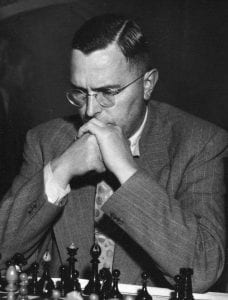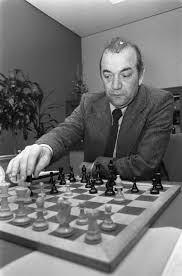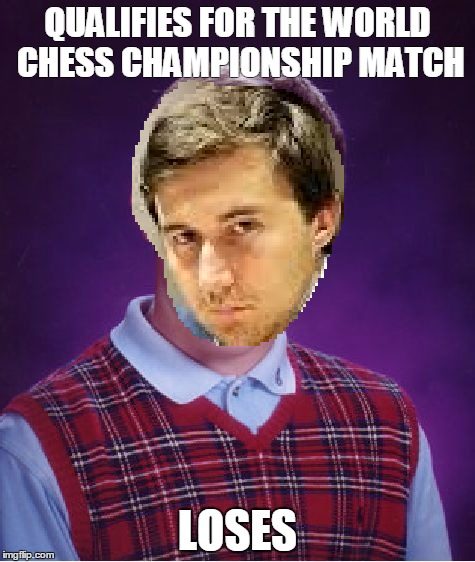In the history of the chess there were only sixteen undisputed World Champions.
The names of those masters who have managed to win the most valuable chess title are rather well known. Every chess player has heard about Wilhelm Steinitz, Jose Raul Capablanca or that Dutch guy who managed to beat Alexandar Alekhine.

Every world chess champion had to win a World Championship Match in order to win the title (if we disregard Botvinnik).
However, since history is written mainly by the winners, we think that chess public sometimes fails to give enough credit to those players who participated on the losing side of historical chess battles.

Therefore, in this post we will portray three best chess players who never became World Champions.
While choosing three best eternal seconds, we were guided by following criteria:
- results in World Championship context and personal score against World Champions
- chess consistency (results in chess tournaments throughout career)
- chess longetivity
Finally, we have concluded that the following three players deserve their mention on this list.
As with any list starting with “best”, there might be some subjectivity involved. But still, let us proceed with our article with the player widely regarded as the GOAT of “chess losers”.
VIKTOR KORCHNOI

The gold medal winner of this highly irrelevant contest is the Soviet Grandmaster Viktor Korchnoi.
I think that the decision to put him on the first place won’t find many opponents, since he is widely regarded as the greatest player never to become World Champion.
Even Garry Kasparov, in his historical masterpiece about his great predecessors, devotes a half of the book to the Viktor the Terrible.
To paraphrase Rowan Atkinson here, “What is it that Viktor has got, that makes him stand apart from other non World Champions?”
We will try to dissect the answer on the basis of the criteria mentioned above:
a) Participation in the World Championship matches
During the chess history there have been numerous chess rivalries.
And while rivalries between World Champions such as Spassky – Fischer or Karpov – Kasparov, are well known even to the people who don’t play chess, the intense and controversial rivalry between Viktor Korchnoi and Anatoly Karpov is to my mind somewhat underestimated.

I believe that there is a couple of reasons for that underestimation:
- Since Korchnoi was never a World Champion, he never got the publicity that the title brings
- Long battles between Korchnoi and Karpov were overshadowed by the later matches between Karpov and Kasparov
- Spassky – Fischer match happened at the height of the Cold War, and therefore it represented a clash of ideologies. Karpov and Korchnoi matches represented a fight between the model Soviet citizen (Karpov) and the defector (Korchnoi has requested political asylum in Holland in 1976).
It is worth remembering that both during Fischer – Spassky and Karpov – Korchnoi matches, Leonid Brezhnev was the head of the SSSR. And whereas it was foolish to expect that he would seriously harm Fischer with the whole USA behind him, it is much more likely that something might have happened to Korchnoi had he won any of the matches against Karpov (there are certain rumors of his potential liquidation, but everything said in this paragraph is mostly my speculation.; for more details about political situation during the Karpov – Korchnoi matches, I cannot recommend the aforementioned Kasparov’s book highly enough).
.jpg)
Naturally, everything happening behind the scenes would have been irrelevant if Korchnoi wasn’t a serious contender in the purely chess sense.
Let us take a deeper look at the three Karpov – Korchnoi matches and their key moments.
Hint: For game analysis, click on any move, and the pop-up board will appear.
1974. chess candidates final in moscow
The first time Korchnoi “missed” his opportunity was technically not a World Championship match, but a final match of the 1974 chess Candidates cycle.
However, as it later turned out, due to Fischer’s decision to end his career, the winner of this match was destined to become the new World Champion.
The match itself was merely a beginning, and not a culmination of the rivalry between these two players.
The initial phase of the match was dominated by Karpov. After using Efim Petrovich Geller’s preparation to breach opponent’s Sicilian Dragon in the 2nd game, Karpov scored another victory in the 6th game as well, after Korchnoi self-destructed from the Black side of the Petrov defence.
However, after the 6th game there followed a pattern that would occur regularly in Karpov’s matches later: a long series of 9 draws.
Then came the 17th game. A highly characteristical game in which Korchnoi blundered after enjoying a better positon for the most of the game:
At this point it seemed that the match is virtually over. Suprisingly though, Korchnoi won the 19th and the 21st game.
21st game especially is very shocking. Judging purely by the moves one would attribute it to the 3rd category tournament rather than to a Candidates final.
Drawing conclusions from the game above, it seems like Karpov relaxed prematurely, which greatly aggravated his match situation. However, he managed to pull himself together and the match ended with three draws and with the overall score 12 1/2 – 11 1/2.

With hindsight, this psychological trait cost Karpov greatly throughout his career. As we will observe later, it almost cost him the match in Baguio City. And it certainly cost him when he failed to finish Kasparov off in their 1984. match, after leading 5-0. But that is a theme for another article.
1978. world championship match in Baguio City
After the 1974. cycle, in a certain interview which Korchnoi gave to B.Kazic for the Yugoslav newspaper Politika, he basically trash talked Karpov and said, among other things, that: “He cannot say that a brilliant future awaits him”.
The result? The authorities banned him from playing in international tournaments and they reduced his grandmaster stipend by one third.
The result? Defection to the West in July of 1976 after requesting asylum in Holland. In those times this act was regarded as an act of treason against SSSR and suddenly Korchnoi became persona non grata in the Soviet World. (source: Kasparov’s book On my great Predecessors, part V).
The result? Highly controversial and politicaly tense match in which many things were happening off the board:
- Korchnoi wearing sunglasses during the games
- Korchnoi having a pair of yogis who were denied of access to the 32th game
- The infamous Dr.Zukhar, Karpov’s “psychological consultant” who sat in the front rows during the games and disturbed Korchnoi so much that he requested his removal from the playing hall. The battle for and against dr. Zukhar was fought throughout the whole match.
More details about off the board controversy can be found here.

Naturally, as stated earlier. everything happening off the board would have been irrelevant had Korchnoi been truly inferior at the board. However, his amazing work-ethic combined with psychological relief after escaping to the West resulted in him reaching a peak when he was 47 years old.
Therefore, he was by no means inferior to Karpov. The chess content was extremely rich and interesting, and judging by the games it would by no means by undeserved if Korchnoi really became a champion in this match.
However, he didn’t manage to endure the tense psychological battle as he had some truly amazing misses and also committed some fatal blunders as well.
Take the 5th game of the match as an example. The first four games ended in a draw, and here Korchnoi missed a nice opportunity to open his account in the match:
If you were stupified by the fact that Korchnoi has missed a simple two move tactic, than perhaps it is a good idea to skip the 17th game completely.
At that moment in the match, Karpov was leading 3-1 and Korchnoi really needed a win badly. The events of the game were partially described in the previous post, but here is the complete score sheet:
You would expect Korchnoi to crumble completely after suffering such a blow.
However, at this point the aforementioned psychological trait of Karpov appeared as he missed some serious chances to end the match completely in his ensuing White games.
Take for instance the position taken from game 20:
Pretty depressing for Black, right?
Still, amazingly enough, Karpov’s killer instinct failed him at some crucial moments such as in the game above (which was drawn in the end).
And by giving Korchnoi these breathing chances he restored the latter’s faith of overall success.
It is no wonder that Korchnoi won the very next, 21st game.
However, after a series of 5 draws, it seemed that match is coming to the end after Karpov won the 27th game. Few believed in Korchnoi’s chances with the score standing at 5-2 in Karpov’s favour.
However, Korchnoi refused to go away.
I was particularly impressed by his technical display from the Black side of the Open Ruy Lopez in the 28th game:
After this brilliancy, Korchnoi also won the 29th and the 31st game, causing the Red alert in the Soviet camp. Just one more win, and the title of World Chess Champion would once again fall into hands of the non- Soviet player.
Therefore, after full mobilization, Korchnoi’s yogis were removed, Dr. Zukhar was reinstalled in the front seats, and 32nd game happened:
A dramatic end to a dramatic match. Surely as in any match, there were missed chances on both sides, but somehow one gets the feeling that Korchnoi was the one who missed more and at more important moments as well.
This is probably the closest Korchnoi has come toward clinching the World Championship title. It was an encounter between two evenly matched players, in which one, to paraphrase George Orwell, proved to be “Slightly more evenly matched than the other.”

Who knows how chess history would have gone if Dr. Zukhar wasn’t seating in the front row during that fatal 32nd game?
1981. world championship match in Merano
Three years after their Baguio City encounter, the main protagonists met again in the Italian city of Merano. Having beaten Petrosian, Polugaevsky and Hüebner, Korchnoi earned himself another opportunity to unnerve the social authorities and try to snatch the World Championship title from Karpov’s hands.
Political issues were once again dominating the pre-match negotiations and agreements. At the time, Korchnoi’s son and wife were both still living in the SSSR, with authorities not allowing them to leave the country. When Korchnoi’s son received an invitation to join the army, Korchnoi tried to publicize this issue as he threatened not to play until his family was released.
Alas, his family wasn’t released, his son was imprisoned for evading the army service, and Korchnoi still played the match (source: chessgames about Merano 1981).

However, considering the events described above, together with Korchnoi’s age and the colossal team of Grandmasters, psychologists and seconds behind Karpov, it is no wonder that this match was much more one – sided than the previous one (later it became widely known as the Massacre in Merano).
Korchnoi displayed uncertain play right from beginning, as he lost games 1,2 and 4. Karpov was armed to the teeth with novelties and kept posing some serious problems with the White pieces to Korchnoi, who avoided his favourite French defense in favour of Spanish and Petroff defenses.
I was especially impressed with Karpov’s piece of preparation displayed in the 14th game. At that particular moment in match the score was standing at 4-2 in Karpov’s favour.
Still, even after this game, with the overwhelming 5-2 lead, Karpov wasn’t assured of his victory, as the shadow of the Baguio city was still very clearly in everyone’s memory.
However, this time there were no miracles and no potential comebacks, as another breaching of the Open Ruy Lopez in the 18th game meant Korcnhoi’s final capitulation:
To wrap it up, there is no other player in the chess history that has been so close to the ultimate chess title on THAT MANY occasions.
Unfortunately for Korchnoi, he lived in the era of another great champion who also had the support of whole Soviet machinery behind him.
If I may indulge into blasphemy here, I quite like the fantasy of Korchnoi shouting the words of Jesus Christ at Karpov:
” Three times you have denied me..”

Oh, have I mentioned that Korchnoi has also reached the final stage of the 1968 Candidates cycle, where he lost to the dominating Spassky?
In total he participated in 10 Candidates cycles. Quite an amazing feat. Which leads us to the next part of the article, and that is:
b) Chess longetivity and consistency
There is a certain saying that chessplayers like when they are trying to justify the choice of chess as a permanent hobby:
” The good thing with chess is that, compared to other sports, you can play it untill your very last days.”
Viktor Korchnoi is the best example that confirms the validity of this saying.
Probably not other player can match the results Korchnoi’s results during his long career.
The most amazing thing is that Korchnoi continued to play the tournaments of the highest calibre even in his 70s and 80s.

Some of the feats he accomplished throughout his impressive career include:
- Korchnoi was a fearless tournament fighter. His impressive career includes at least 200 victories in international invitation tournaments, international open tournaments and FIDE official contest held with classical time control. Chronological list of Korchnoi’s first prizes is available at the following link: 1st Prize chronology – www.chessdiagonals.ch – Viktor Korchnoi
- Prior to his defection to West in 1976., he was also the sole winner in four Soviet Championships. Only Botvinnik and Tal, both with six wins, have more (there is also Peter Svidler with seven wins in the modern era, although Russian Superfinal is considerably weaker nowadays). One has to bear in mind that Korchnoi achieved his peak AFTER his defection. Therefore, this record is truly a remarkable achievement.
- He beat the future Fide World Champion Ruslan Ponomariov in a match when he was 70 years old (the age difference between the players was 53 years!!)
- He beat the future number two Fabiano Caruana in 2011, when he was 80 years old (!!!)
- He was a top 100 member when he was 70 years old
- Korchnoi had an impressive record against World Champions:
- An equal score against Mikhail Botvinnik (1-1 in terms of decisive games)
- A highly positive score against Mikhail Tal (13-4 in terms of decisive games in Korchnoi’s favour)
- Positive score against Tigran Petrosian (12-10 in terms of decisive games in Korchnoi’s favour)
- Positive score against Boris Spassky (21 – 16 in terms of decisive games in Korchnoi’s favour)
- Equal score against Robert Fischer (2-2 in terms of decisive games)
Taking everything into account, one is almost inclined to forgive him that he became…erm.. grumpy old fellow in his old days?
Okay.. let’s be honest…. Basically, he often behaved like an old prick after losing a game.
Take the following video as an example, in which he exclaims that this is the first and the last time that Sofia Polgar has won a game against him.
Or this video in which he behaves like a spoiled brat after losing to Peter Leko.
Or this interview in which he basically calls Carlsen an amateur.

However, if we disregard Korchnoi losing it a bit in his old days, we can only look at his career and bow down to the greatest player never to become World Champion.
CONCLUSION
Phew… This turned out to be quite a long one. Hopefully you enjoyed reading this post and will perhaps appreciate Korchnoi’s greatness if you weren’t familiar with it before.
In the part two of this series, we will examine the games and paths of numbers two and three on our list – Paul Keres and David Bronstein.

